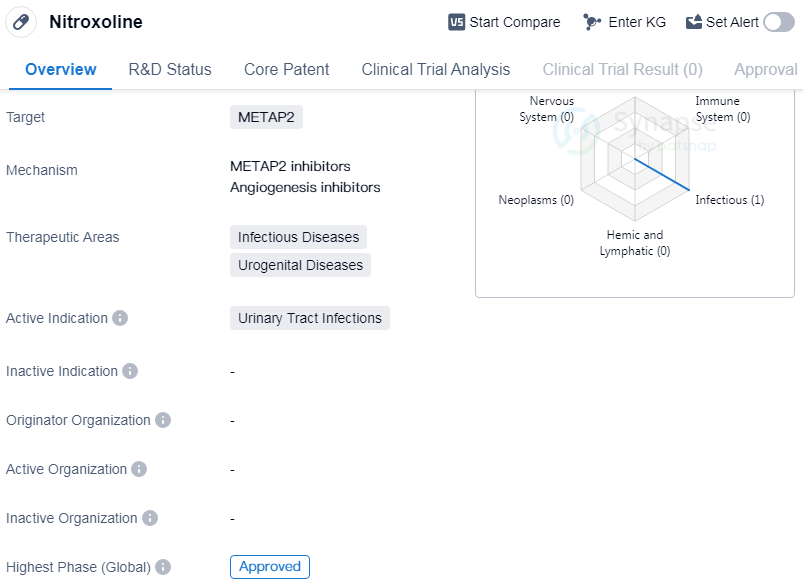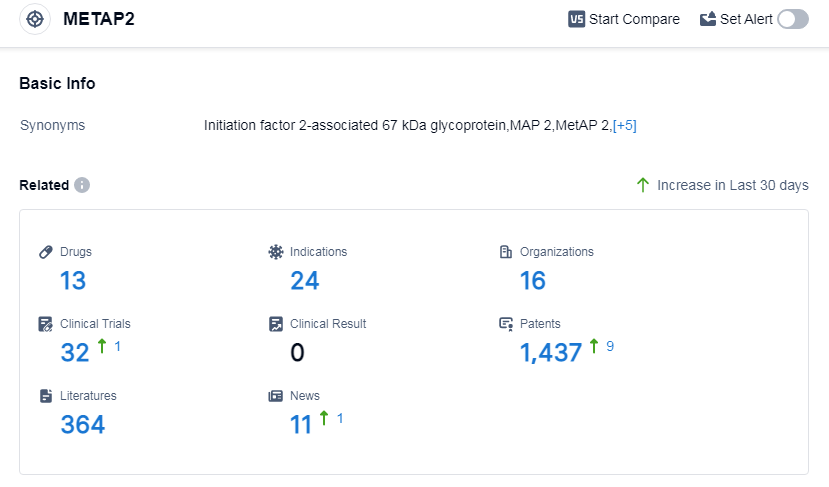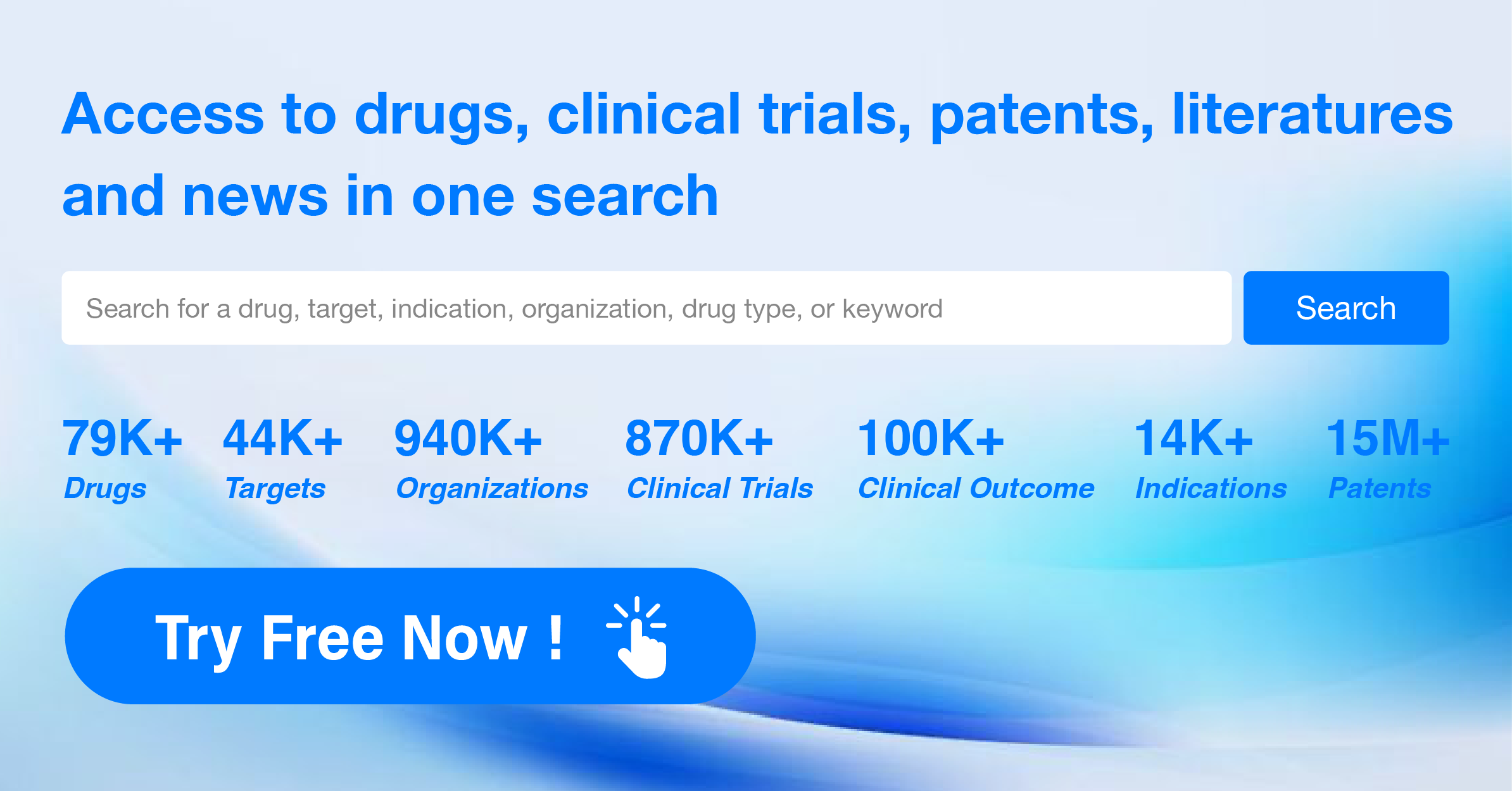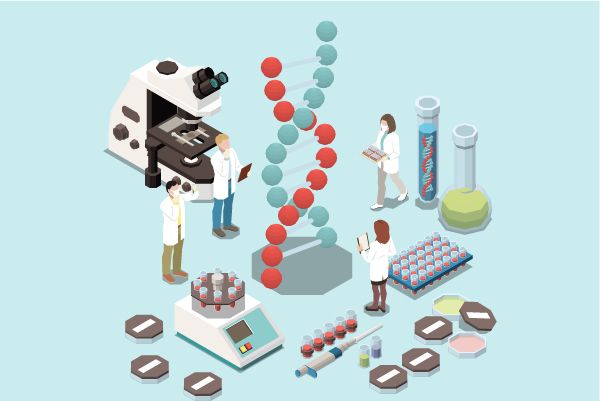A Comprehensive Review of Nitroxoline's R&D Innovations and Drug Target Mechanism
Nitroxoline's R&D Progress
Nitroxoline is a small molecule drug that primarily targets methionine aminopeptidase 2 (METAP2). It falls under the therapeutic areas of infectious diseases and urogenital diseases, with its active indication being urinary tract infections. Currently, Nitroxoline has reached the highest phase of development, which is approved on a global scale.
Nitroxoline is a small molecule drug, indicating that it consists of low molecular weight compounds. This characteristic allows for easier absorption and distribution within the body, potentially leading to more effective treatment outcomes.
The drug specifically targets METAP2. METAP2 is an enzyme involved in various cellular processes, including protein synthesis and degradation. By targeting this enzyme, Nitroxoline may inhibit its activity and potentially disrupt the growth and survival of pathogens causing urinary tract infections.
The therapeutic areas of infectious diseases and urogenital diseases highlight the potential applications of Nitroxoline. Infectious diseases refer to illnesses caused by pathogenic microorganisms, such as bacteria, viruses, fungi, or parasites. Urogenital diseases, on the other hand, pertain to conditions affecting the urinary and genital systems. Nitroxoline's active indication for urinary tract infections suggests that it is specifically designed to combat infections in the urinary tract, which commonly occur due to bacterial invasion.
The fact that Nitroxoline has reached the highest phase of development, which is approved, indicates that it has successfully undergone rigorous testing and evaluation. This approval signifies that the drug has demonstrated safety and efficacy in treating urinary tract infections. It also implies that Nitroxoline has met the necessary regulatory requirements and can be marketed and prescribed to patients.
👇Please click on the image below to directly access the latest data (R&D Status | Core Patent | Clinical Trial | Approval status in Global countries) of this drug.
Mechanism of Action for Nitroxoline: METAP2 Inhibitors and Angiogenesis Inhibitors
METAP2 inhibitors are a type of drug that targets and inhibits the activity of the enzyme called METAP2. This enzyme plays a role in the processing and degradation of proteins within cells. By inhibiting METAP2, these inhibitors can regulate protein metabolism and potentially have therapeutic effects.
From a biomedical perspective, METAP2 inhibitors have been studied for their potential in treating various diseases, particularly metabolic disorders and cancer. In metabolic disorders, such as obesity and diabetes, METAP2 inhibitors can modulate energy metabolism and improve metabolic parameters. In cancer, these inhibitors have shown promise in inhibiting tumor growth and metastasis by interfering with angiogenesis, which is the process of forming new blood vessels to supply nutrients to tumors.
Angiogenesis inhibitors, on the other hand, are a class of drugs that specifically target the process of angiogenesis. Angiogenesis is a normal physiological process that occurs during tissue growth and repair, but it is also a critical step in the development and progression of diseases like cancer. These inhibitors work by blocking the formation of new blood vessels, thereby depriving tumors of the necessary nutrients and oxygen for their growth.
In the context of biomedicine, angiogenesis inhibitors have been extensively studied and developed as a therapeutic approach for various diseases, particularly cancer. By inhibiting angiogenesis, these drugs can potentially slow down or halt tumor growth, prevent the spread of cancer cells, and enhance the effectiveness of other cancer treatments like chemotherapy and radiation therapy.
To summarize, METAP2 inhibitors are drugs that target the enzyme METAP2 and have potential therapeutic applications in metabolic disorders and cancer. Angiogenesis inhibitors are drugs that specifically target the process of angiogenesis and are primarily used in the treatment of cancer.
Drug Target R&D Trends for Nitroxoline
According to Patsnap Synapse, as of 14 Sep 2023, there are a total of 13 METAP2 drugs worldwide, from 16 organizations, covering 24 indications, and conducting 32 clinical trials.
The analysis of the current competitive landscape of target METAP2 reveals that Asieris Pharmaceuticals Co., Ltd. is the leading company in terms of development stages. The R&D progress of companies varies, with multiple drugs in different phases. Several drugs have been approved for indications such as urinary tract infections, while others are in various stages of development for different indications. Small molecule drugs are progressing rapidly, with one approved and several in preclinical and inactive stages. The countries/locations with the highest development phases include China, the United States, and Australia. However, further information regarding the progress in China is required to provide a detailed analysis of the country's development. Overall, the target METAP2 shows potential for future development in the pharmaceutical industry.
👇Please click on the picture link below for free registration or log in directly if you have a freemium account, you can browse the latest research progress on drugs, indications, organizations, clinical trials, clinical results, and drug patents related to this target
Conclusion
In summary, Nitroxoline is a small molecule drug that targets METAP2 and is primarily used for the treatment of urinary tract infections. Its therapeutic areas include infectious diseases and urogenital diseases. With its highest phase being approved, Nitroxoline has successfully completed the necessary testing and evaluation, making it a potentially valuable option for patients suffering from urinary tract infections.






